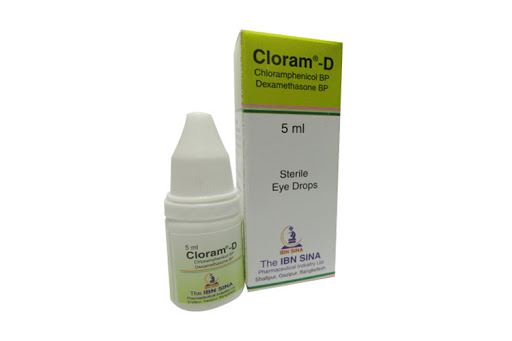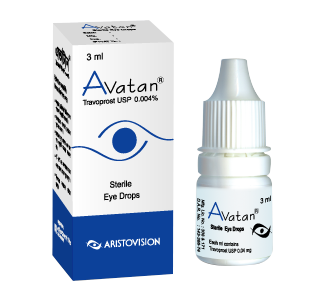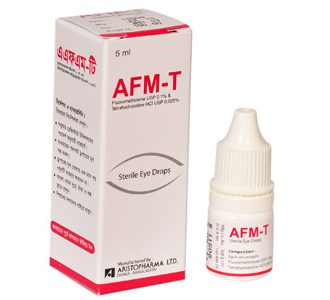Cloram-D (Drop) 5ml
৳ 70.00
Indications
Eye: For steroid-responsive inflammatory ocular conditions for which a corticosteroid is indicated and where bacterial infection or a risk of bacterial ocular infection exists. It is also indicated in chronic anterior uveitis and corneal injury from chemical radiation or thermal burns or penetration of foreign bodies. The combination can also be used for post-operative inflammation and any other ocular inflammation associated with infection.
Ear: Otitis externa, Otitis media and chronic suppurative otitis media.
Therapeutic Class
Ophthalmic steroid – antibiotic combined preparations
Pharmacology
Dexamethasone is a glucocorticoid. It has an anti-inflammatory and anti-allergic action. It is used topically in the treatment of inflammatory conditions of the anterior segment of the eye. Dexamethasone is absorbed rapidly after oral administration with a half-life of about 190 minutes. Sufficient absorption may occur after topical application to the skin and eye to produce systemic effects.
Chloramphenicol is a broad spectrum bacteriostatic antibiotic active against a wide variety of gram-negative and gram-positive organisms. Chloramphenicol exerts its antibacterial effect by binding to bacterial ribosomes and inhibiting bacterial protein synthesis at an early stage
Dosage & Administration
Eye-
- Corneal Ulcers: The recommended dosage regimen for the treatment of corneal ulcer is two drops into the affected eye every 15 minutes for the first six hours and then two drops into the affected eye every 30 minutes for the remainder of the first day. On the second day, instill two drops in the affected eye hourly. On the third through the fourteenth day, place two drops in the affected eye every four hours. Treatment may be continued after 14 days if corneal re-epithelialization has not occurred.
- Bacterial Conjunctivitis: The recommended dosage regimen for the treatment of bacterial conjunctivitis is one or two drops instilled into the conjunctival sac(s) every two hours while awake for two days and one or two drops every four hours while awake for the next five days.
Ear-
- For all infections two to three drops every two to three hours initially. Frequency should be decreased gradually as warranted by improvement in clinical signs. Care should be taken not to discontinue therapy prematurely.
Interaction
Dexamethasone: None relevant to topical use.
Chloramphenicol: Chloramphenicol should not be administered simultaneously with bactericidal substances (penicillins, cephalosporins, gentamicin, tetracyclines, polymyxin B, or vancomycin) since bacteriostatic antibiotics may inhibit bactericidal antibiotics. Furthermore Chloramphenicol should not be administered at the same time as systemic treatment with drugs which have an adverse effect on hematopoiesis, nor simultaneously with sulphonylureas, coumarin derivatives, hydantoins and methotrexate (precautionary measured).
Chloramphenicol: Chloramphenicol should not be administered simultaneously with bactericidal substances (penicillins, cephalosporins, gentamicin, tetracyclines, polymyxin B, or vancomycin) since bacteriostatic antibiotics may inhibit bactericidal antibiotics. Furthermore Chloramphenicol should not be administered at the same time as systemic treatment with drugs which have an adverse effect on hematopoiesis, nor simultaneously with sulphonylureas, coumarin derivatives, hydantoins and methotrexate (precautionary measured).
Contraindications
Epithelial herpes simplex keratitis (dendritic keratitis), vaccinia, varicella and in many other viral diseases of the conjunctiva and cornea. Mycobacterial infections of the eye,
Fungal diseases of ocular structures. Hypersensitivity to any of the components of the medication.
Fungal diseases of ocular structures. Hypersensitivity to any of the components of the medication.
Side Effects
Adverse reactions seen with Chloramphenicol are transient ocular burning or discomfort. Other reported reactions include stinging, redness, itching, conjunctivitis/keratitis, periocular/facial edema, foreign body sensation, photophobia, blurred vision, tearing, dryness and eye pain.
Pregnancy & Lactation
US FDA Pregnancy category C. There are no adequate and well-controlled studies in pregnant women. This drug should be used during pregnancy only if the potential benefit justifies the potential risk to the fetus. Caution should be exercised when Dexamethasone ophthalmic solution is administered to a nursing woman.
Precautions & Warnings
The possibility of persistent fungal infections of the cornea should be considered after prolonged corticosteroid dosing. There have been reports of bacterial keratitis associated with the use of multiple dose containers of topical ophthalmic products. These containers had been inadvertently contaminated by patients who, in most cases, had a concurrent corneal disease or a disruption of the ocular epithelial surface.
Use in Special Populations
Safety and efficacy in pediatric patients have not been established.
Storage Conditions
Store between 2-8° C in a cool and dry place protected from light. Keep out of reach of children. Do not touch the dropper tip to surfaces since this may contaminate the solution. Do not use after 30 days of first opening.






Reviews
There are no reviews yet.